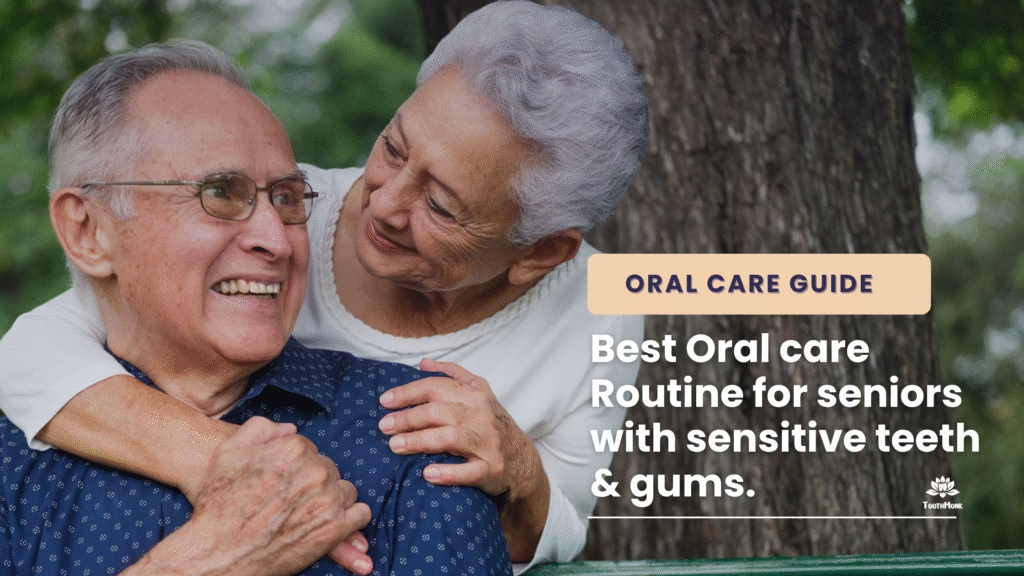
Understanding the Needs of Aging Smiles
As we age, our oral health requires more attention. Seniors often experience increased sensitivity, gum recession, dry mouth, and other challenges that make a standard oral care routine less effective. A tailored approach is essential to ensure comfort, prevent disease, and maintain quality of life. Sensitive teeth and gums in older adults aren’t just a sign of aging, they’re a signal to adapt and care more mindfully.
Common Dental Challenges Faced by Seniors
- Tooth Sensitivity: Often caused by enamel wear, gum recession, or untreated decay.
- Gum Recession and Disease: Gums may shrink, exposing roots and increasing infection risks.
- Dry Mouth (Xerostomia): Common due to medications or health conditions, reducing natural saliva’s protective role.
- Wearing Dental Work: Crowns, bridges, and dentures need specific care.
- Reduced Dexterity: Conditions like arthritis can make brushing and flossing harder.
Step-by-Step Oral Care Routine for Seniors
1. Choose a Gentle Toothbrush
Use a soft-bristled or electric toothbrush with a small head. Electric brushes with pressure sensors are ideal for those with arthritis or coordination issues. Soft bristles are gentle on gums and reduce the risk of further enamel wear.
2. Use Desensitizing Toothpaste
Toothpastes with potassium nitrate or stannous fluoride help reduce sensitivity by blocking pain signals to the nerve. Make it a routine and avoid whitening pastes, which may worsen sensitivity.
3. Brush Twice Daily for 2 Minutes
Brush gently using circular motions, especially at the gum line. Don’t scrub too hard, aggressive brushing can cause more gum recession.
4. Floss or Use Alternatives
Flossing can be difficult for seniors. Interdental brushes or water flossers are great alternatives that remove plaque and reduce gum inflammation without discomfort.
5. Rinse with Alcohol-Free Mouthwash
Look for mouthwashes with fluoride and ingredients designed to soothe gums and help fight dry mouth. Alcohol-based rinses can worsen dryness.
6. Stay Hydrated
Saliva is crucial for oral health. Encourage frequent water sips, especially for those on medications causing dry mouth. Sugar-free lozenges or gum with xylitol can also stimulate saliva.
7. Mind Your Diet
Avoid acidic, spicy, or very hot/cold foods that may trigger sensitivity. Focus on a diet rich in calcium, vitamin D, and fiber. Crunchy vegetables also help stimulate saliva and clean teeth naturally.
8. Check Dentures & Dental Work
Ensure dentures fit properly to avoid gum irritation. Clean dentures daily and remove them at night to let gums rest.
9. Visit the Dentist Regularly
Regular dental check-ups are critical to catch early signs of gum disease, cavities, or oral cancer. Dentists can also recommend fluoride treatments or prescription pastes for added protection.
Special Tips for Caregivers
- Assist with brushing or provide adaptive tools for better grip.
- Monitor for mouth sores, pain, or signs of infection.
- Help maintain a dental appointment schedule.
Sensitive teeth and gums don’t mean the end of a confident smile. With the right care, seniors can enjoy strong, healthy teeth and improved well-being. At Toothmonk, we believe every stage of life deserves tailored oral care, and we’re here to guide every step of the way.
#HealthySmilesForLife #ToothmonkCare #SeniorOralHealth
